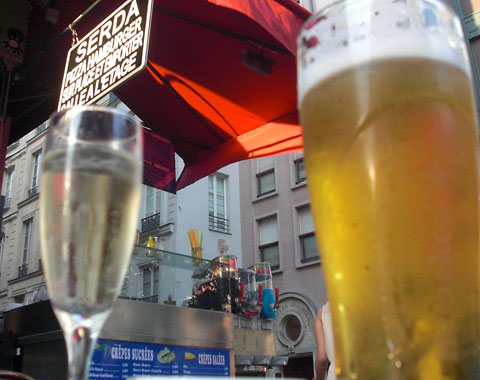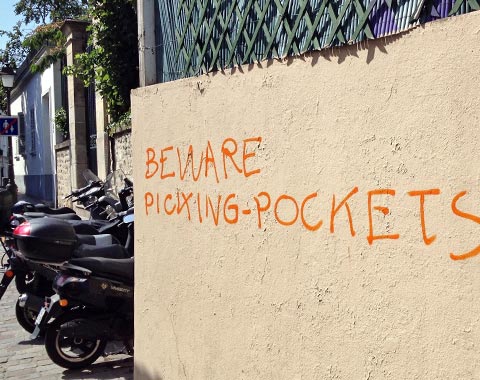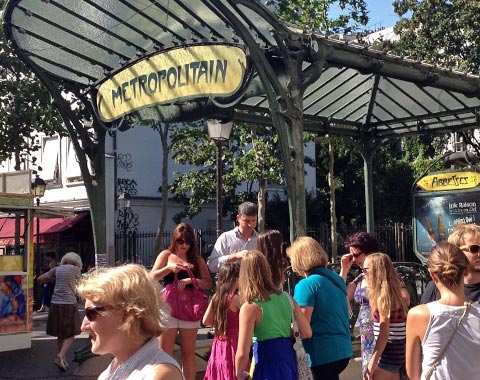 Plan more,
Plan more,
worry less,
and enjoy the trip.
On a three-week trip through Portugal, Spain and France, I drank less coffee but more wine. Ate less but walked more. Lost weight but kept my cool (mostly). Lost my iPhone but kept my money, credit cards and passport.
It was a great trip. I learned things that I hope help you or a friend plan your next trip. Please share this article with anyone thinking about a European vacation.
12 tips for happier travels
- THE INTERNET IS YOUR FRIEND
- Use it before and during your trip to plan your travel, lodging and daily activities.
- I love TripAdvisor.com for its reviews, and have rarely been burned (see Change Your Mind below). Read the positive reviews, but more importantly read the negative ones. Pay attention to the ratio of "Excellent" to "Terrible" reviews and judge accordingly.
- Book ahead to avoid lines: during peak tourist season major attractions like La Sagrada Familia (Barcelona), the Eiffel Tower, etc. will have lines 2 hours long. Fortunately, many museums and attractions let you book tickets online and skip the wait. You can usually do this as late as the night before you plan to visit.
One problem: you may need to print tickets, so if you're using your hotel wi-fi, ask if you can use their printer. More web-savvy attractions can scan the ticket from your smartphone. - If advance tickets aren't available, like for the Catacombs in Paris, go early. "Early" means at least an hour before it opens. You won't be the first one in line.
- PACK LIGHT
- We were constantly amazed by people dragging huge suitcases through the airport or train station. Why? If you pare down your wardrobe, wash your clothes every few days in the hotel sink or a laundromat, and leave everything unnecessary at home you free yourself to do just about anything.
- How small is small? Ryan Air is a super-cheap way to travel in Europe but has very restrictive carry-on size limits. If you can get your stuff in a carryon that fits their rules you'll be able to easily use planes, trains and subways anywhere you go. A couple smaller airlines have even tougher restrictions.
- BACK UP YOUR PHOTOS
- If you use your smartphone as your camera, take this simple but critical precaution: install an app (I used IFTTT) that automatically uploads pictures to an online service like Dropbox or Flickr. If you lose your phone or it gets stolen, you won't lose your memories of your trip. This simple step made the disappearance of my iPhone two weeks into our trip a disappointment but not a disaster.
- If you're using a digital camera and have a laptop with you, back up every night.
- TAKE SOME CASH
- Before you leave home it's a good idea to get about $100 in local currency (Euros, in most countries) for cab fare, snacks, etc. Changing money at the airport is expensive. Once you're settled in you can use your credit card or ATM…maybe.
- I had two credit cards and an ATM, but there were times they didn't work. Fortunately I had a prepaid VISA TravelMoney card from AAA. It worked every time, saving our butt more than once. This comes at a price, of course, fees that ranged from $1 to $10 per transaction.
- WEAR A MONEY BELT
- Pickpockets are everywhere (see below). Always keep your cash, credit cards, etc. in a money belt or pouch around your neck. Always.

- OUTSMART PICKPOCKETS
- Everywhere we went we were warned about pickpockets, especially at major attractions and train/Metro stations. I thought I had my iPhone in a safe place, the front pocket of my cargo pants, with Velcro tabs, but still it vanished on the Paris Metro. This could have been a disaster, but...
- Because I had my credit cards, drivers license, etc. in a money belt, and I'd uploaded my photos (see above), I was upset to find my phone gone, but not suicidal.
- TAKE FREE TOURS
- Absolutely the best way to start your visit. Major European cities have free tours led by residents/natives. We took them in Porto, Madrid, Barcelona and Paris, and all were excellent. Enthusiastic guides showed us their cities, gave advice on where to eat and how to get around, and never pressured us for a tip. Of course the guides earn their living from tips, but you choose how much. I was a cheapskate, giving each 5 or 10 Euros. Wish I'd given more, they earned it.
- Find tours online by looking for "free walking tour" + city name. We had good experiences with Pancho Tours (Porto), Ogotours (Madrid), RunnerBean and DiscoverWalks (Barcelona), and City Free Tour and DiscoverWalks (Paris). In Paris, DiscoverWalks gave free discount coupons for a concert at Ste. Chappelle, a cruise on the Seine, and more. We saved more than we tipped.
 TAKE THE PUBLIC TRANSPORTATION
TAKE THE PUBLIC TRANSPORTATION
- Hey, fellow Americans…it's different in Europe! In most big cities, pubic transportation is fast, frequent, clean and mostly safe. Yes, pickpockets are an issue. Still, we rode the Metro (subway or rail line) in Porto, Madrid, Barcelona and Paris day and night and had almost no problems.
- Fare is $2-3 per ride, and 10-ride packages are cheaper still. Virtually every station has electronic signs that tell you when the next train will arrive, and we never waited more than 10 minutes. Ask for a free subway map at the airport, station, or your hotel and keep it with you at all times.
- SAY HELLO
- Like most Americans I only speak English, but that's not an asset. Keep it from being a liability by learning to say "Hello", "Please" and "Thank you" in the native language of the country you're visiting. People are a lot more friendly if you say "Hola" or "Bon jour" before blurting out your question in English. In three countries and four cities we found people to be gracious and helpful virtually every time.
- STAY AWHILE
- You can visit most cities and see the sights in a day or two, but why not get to know a place better? It takes me about three days somewhere new to start to feel comfortable. By then I've become familiar with the neighborhood around the hotel, learned to navigate the Metro, picked up a few words of the language, and gotten a taste for the food. I'm still a tourist, but I feel more at home. Much better.
- CHANGE YOUR MIND
- Don't be afraid to change your itinerary when you get there. Planning ahead is great, but sometimes you need to go with the flow. One of our best decisions in Barcelona was to switch hotels after the first night. What had looked good online was hot, noisy and depressing. We went online and found a place way better in every way.
- LEAVE HOME BEHIND
- You'll see Holiday Inn, McDonald's, and other familiar logos. Avoid them. Trade your "American style" breakfast for a cappuccino and croissant. Walk everywhere, sit in cafes, buy fruit on the street and eat it in a park.
- Travel challenges you to see things differently. It offers new sights, tastes and sounds: take in as much as you can.
- Take pictures, keep a journal, make sketches.
- Enjoy the trip.
VIDEOS